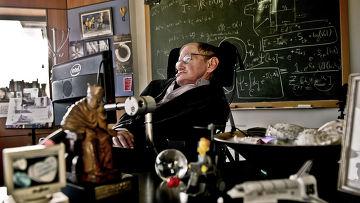Stephen Hawking: physics would be 'more interesting' if Higgs boson hadn't been found
Supersymmetry is the concept that known particles – such as electrons, quarks and photons – have a heavier and as-yet-undetected "superpartner". The superpartners of quarks and electrons, for example, are called squarks and selectrons; the superpartners of the Higgs, and of force carriers such as the photon, are the higgsino and photino. Experimental evidence for the idea has, however, been elusive.
In recalling the bet he made with Kane about the Higgs boson, Hawking admitted enjoying gambling. "Throughout my life, I have had a gambling problem," he said. "When I was 12, one of my friends bet another friend a bag of sweets that I would never come to anything. "I don't know if this bet was ever settled, and if so, which way it was decided. "I had six or seven close friends, and we used to have long discussions and arguments about everything, from radio-controlled models to religion. One of the things we talked about was the origin of the universe, and whether it required a God to create it and set it going."
Hawking is no stranger to losing bets about the nature of cosmos. Along with Kip Thorne, he bet John Preskill that information should be destroyed when something fell into a black hole. The so-called "information paradox" was troubling because Hawking's calculations suggested that anything that fell into a black hole would be obliterated, including the information about what that stuff was. But destroying information is not allowed under the rules of quantum mechanics.
After 30 years of arguing, Hawking said he eventually found a resolution. "Information is not lost in black holes, but it is not returned in a useful way," he said. "It is like burning an encyclopaedia. Information is not lost, but it is very hard to read." He gave Preskill a baseball encyclopaedia to concede his side of the bet. "Maybe I should have just given him the ashes. The fact that I used to think that information was destroyed in black holes was my biggest blunder. Well, at least it was my biggest blunder in science."
Many of Hawking's insights have come from studying the cosmos, and the scientist said people needed to get more interested in the space around us for more prosaic reasons. "We must also continue to go into space for the future of humanity," he said. "I don't think we will survive another thousand years without escaping beyond our fragile planet. I therefore want to encourage public interest in space, and I've been getting my training in early." Hawking recently took part in a zero-gravity flight, which is part of the training for astronauts to experience the weightlessness of space.
Hawking said that the recent Nobel prize for Engelert and Higgs had been a reminder to him that it was "a glorious time to be alive and doing research in theoretical physics. Our picture of the universe has changed a great deal in the past 50 years, and I'm happy if I have made a small contribution." He added: "So remember to look up at the stars and not down at your feet. Try to make sense of what you see and hold on to that childlike wonder about what makes the universe exist."
Alok Jha

